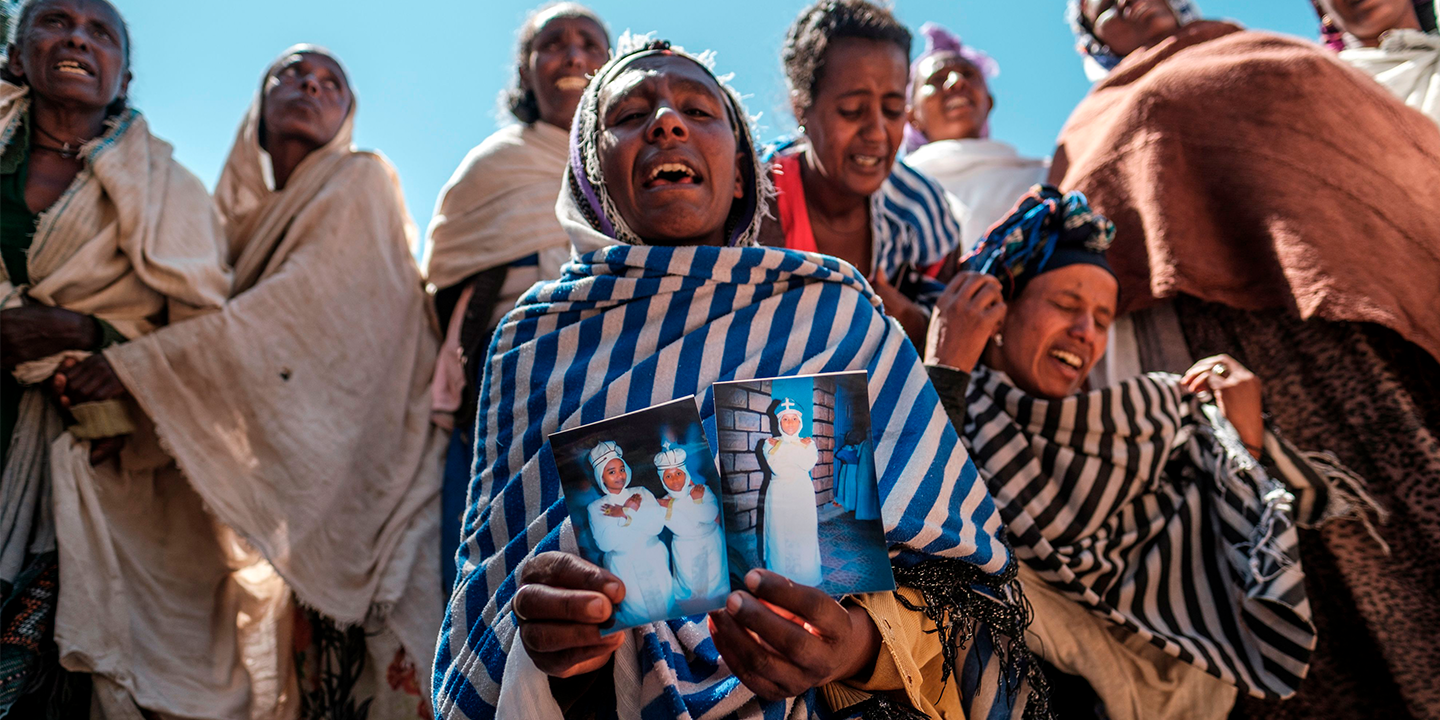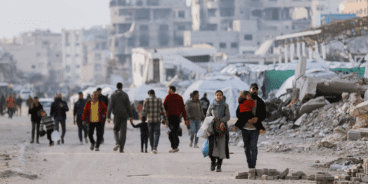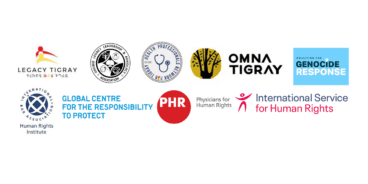

Atrocity Alert No. 296: Ethiopia, Mali and Myanmar (Burma)
Atrocity Alert is a weekly publication by the Global Centre for the Responsibility to Protect highlighting situations where populations are at risk of, or are enduring, mass atrocity crimes.
EVIDENCE OF ETHNIC CLEANSING IN ETHIOPIA’S WESTERN TIGRAY
On 6 April Amnesty International and Human Rights Watch released an extensive report on the situation in Ethiopia’s Western Tigray Zone. The report found evidence of the commission of war crimes, crimes against humanity and ethnic cleansing perpetrated against populations in Western Tigray since the conflict began in November 2020. Hundreds of witnesses and survivors detailed abuses by Amhara regional forces and the irregular Amhara “fano” militia, with the acquiescence and possible participation of Ethiopian federal forces. These forces committed murder, enforced disappearances, deportation and/or forcible transfer, sexual violence – including rape and sexual slavery – persecution, unlawful imprisonment and possible extermination of the Tigrayan population.
According to the report, abuses and policies put in place by Amhara authorities show a clear pattern of ethnic cleansing of Tigrayans from the area. Amhara forces, along with Eritrean security forces, destroyed and looted villages, livestock and harvests, and also subjected Tigrayans to extrajudicial executions, arbitrary detentions and torture. In one instance, Amhara Special Forces rounded up dozens of male Tigrayan residents of Adi Goshu in January 2021 and summarily executed around 60 people at the Tekeze River bridge. A survivor of the massacre said, “after the Tekeze incident happened, Tigrayans left in big numbers… We were not part of the town… We were not allowed to live.”
While tens of thousands of Tigrayans fled the abuses, Amhara authorities attempted to coerce those that remained to leave by subjecting them to ethnically targeted restrictions on movement, humanitarian aid, use of their own language and access to farmland. In some areas, the authorities displayed signs demanding that Tigrayans depart and issued ultimatums to leave or be killed. Amhara authorities also organized transportation that took Tigrayans out of Amhara-controlled areas in Western Tigray, confiscated their documents and warned them not to return. Meanwhile, Amhara authorities called for the settlement of Amhara residents into Western Tigray. Thousands of Tigrayans remain in overcrowded detention facilities in Western Tigray.
These abuses are clear evidence of the commission of war crimes, crime against humanity and ethnic cleansing that deserve full, unhindered investigations and prosecutions of those responsible. This evidence must reinvigorate international pressure for a lasting solution to the conflict in northern Ethiopia.
“WORST SINGLE ATROCITY” IN THE DECADE-LONG CONFLICT IN MALI
Several hundred people were reportedly summarily executed in the town of Moura, central Mali, during military operations conducted from 27 to 31 March by the Malian Armed Forces (FAMa) and suspected Russian mercenaries. After multiple reports on social media of a civilian massacre, on 1 April the defense ministry claimed that 203 “terrorists” were killed and 51 were arrested. According to an investigation by Human Rights Watch, hundreds of people were rounded up by the FAMa and mercenaries, then an estimated 300 civilian men – some suspected Islamist fighters – were summarily executed in the “worst single atrocity” in Mali’s decade-long armed conflict. The majority of victims killed in the massacre were members of the Fulani, or Peuhl, ethnic group, which have been targeted for recruitment by Islamist armed groups in recent years.
The UN Independent Expert on the situation of human rights in Mali, Alioune Tine, said that, “the information received at this stage raises serious questions and concerns about possible serious violations of international human rights law and/or international humanitarian law. Furthermore, some of these violations could constitute crimes within the jurisdiction of the International Criminal Court.” All parties to the armed conflict in Mali are obligated to abide by International Humanitarian Law. The deliberate killing or other abuse of a person in custody is a war crime.
The incident has drawn widespread condemnation and calls for full and independent investigations. The Prosecutor of the Mopti Military Tribunal and the UN peacekeeping mission in Mali (MINUSMA) have both announced separate investigations. Despite engagement with Malian authorities, authorization for UN peacekeepers to access the area has not been granted thus far.
Moura is located in central Mali, which has been the epicenter of conflict, atrocities and displacement in the country since 2015. Access to the area is difficult and the village has been controlled for several years by militants from the armed group Katiba Macina, a member of the Group for the Support of Islam and Muslims (affiliated with al-Qaeda). In an attempt to curtail the spread of these groups, the FAMa launched an offensive in Moura as part of “Operation Keletigui.” The UN has received reports of sexual violence, arbitrary arrests and looting during the offensive in Moura.
Malian authorities must urgently conduct a thorough and impartial investigation into the alleged violations, make public its findings and hold the responsible perpetrators to account. Malian authorities should also extend the necessary cooperation for MINUSMA to access the site of the alleged massacre, in line with its mandate. All armed actors in Mali must ensure that civilians are protected without discrimination. The International Criminal Court should open investigations to establish criminal responsibility.
ARSON AND AIRSTRIKE CAMPAIGNS CONTINUE UNABATED IN MYANMAR
Populations in northwest Myanmar (Burma) continue to face atrocities perpetrated by the military – the Tatmadaw – amidst its ongoing scorched earth campaign. The situation in Sagaing – a resistance stronghold – is particularly grave, as the military has burned an estimated 750 houses across Khin-U Township alone since 5 March. On 7 April the military raided Sagaing’s Ywar Nan village, killing at least seven civilians and burning hundreds of houses. The series of arson attacks are the latest in the Tatmadaw’s large-scale offensive in apparent retaliation over attacks perpetrated by armed resistance groups. The arson campaign may amount to crimes against humanity and war crimes. As of 1 April the Tatmadaw had destroyed nearly 8,000 civilian homes since the February 2021 coup, with the majority of attacks concentrated in Magway, Sagaing and Chin regions.
The military is also continuing its use of airstrikes in the southeast, destroying civilian infrastructure and displacing thousands of people, amidst heavy fighting with armed resistance groups. On 10 April the military began targeting resistance forces along the Thai border in Karen State, with fighting breaking out over control of the pro-democracy town of Lay Kay Kaw. Thousands of residents had previously fled the town in December and the renewed clashes have forced more to flee for safety.
More than 900,000 people are displaced in Myanmar, including 560,000 since the coup. The UN Refugee Agency estimates that 35,700 people have crossed into neighboring countries. Thai authorities have reportedly begun forcibly returning refugees to Myanmar. Liam Scott, Research Associate at the Global Centre for the Responsibility to Protect, said that, “in keeping with the 1951 Refugee Convention, Myanmar’s neighbors have a moral and legal obligation to give temporary protection to refugees forced to flee their homes as a result of mass atrocities and persecution, and to refrain from returning them to Myanmar.”
The Association of Southeast Asian Nations (ASEAN) states should immediately take bilateral steps to uphold their responsibility to protect, including by imposing arms embargoes and sanctions on Myanmar’s oil and gas sector. ASEAN member states, especially Malaysia and Singapore, should halt the flow of aviation fuel into Myanmar. Member states must also respect the principle of non-refoulement and provide safe haven to refugees. As the one-year anniversary of ASEAN’s “Five-Point Consensus” approaches later this month without effective implementation, the UN Security Council should stop deferring to ASEAN and impose a global arms embargo on Myanmar and sanction the country’s oil and gas sector.
Related Content


